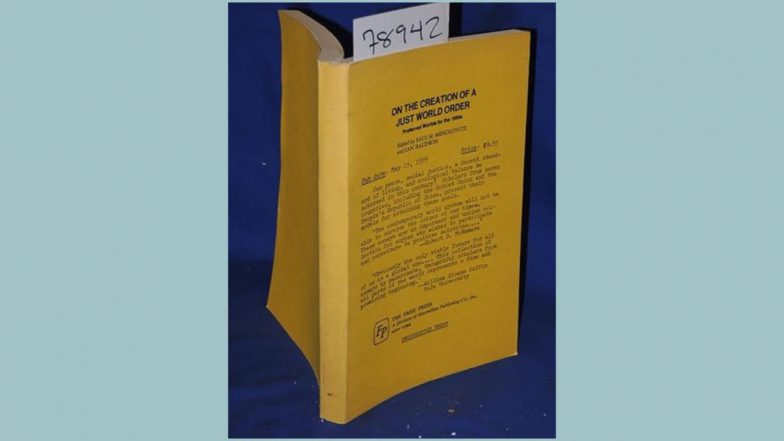Summary
“On the Creation of a Just World Order” is part of the “Urgent Issues in American Society Series”.
The book, published by Free Press on January 1, 1975, focuses on the pursuit of establishing a fair and equitable global system.
These books offer diverse perspectives and analyses on the concept of world order, covering areas like international law, human rights, and the dynamics of global power structures. They also provide valuable insights into the historical context and potential pathways for creating a more just and peaceful global society.
OnAir Post: On the Creation of a Just World Order
About
Web Links
Saul Howard Mendlovitz
Saul Howard Mendlovitz was the Dag Hammerskjold Chair of Peace and World Order Studies at Rutgers Law School from 1956 until 2023. He was passionately dedicated to “the abolition of war,” justice, and safety for all. Saul, a twin, was born February 16, 1925 in Scranton, PA to Orthodox Jewish parents who emigrated from Poland and Hungary.
He was a happy and enthusiastic learner from childhood to age 99. Saul was drafted in 1944 into the 104th Division, landing at Normandy on September 7, 1944. During basic training, he knew “with certainty” he could never shoot a person, and through luck or grace served in a MASH Unit supporting shell-shocked soldiers. Through the GI Bill, Saul received a B.A. in sociology at Syracuse University and an International Law J.D. at the University of Chicago. In 1956, he joined Rutgers Law School, replacing and inheriting the legacy of Raphael Lemkin, the professor who coined the term “genocide.”
Saul was an early critic of the War in Vietnam, spoke against nuclear arms, and promoted the “abolition of war.” He believed a world without conflict wasn’t possible, yet a world without war was. Saul taught International Law and a Just World Order, and his favorite — Law and Humanities through age 98. Saul created peace education materials for universities globally at the World Law Fund in New York City.
He founded the World Order Models Project — teams of scholars on six continents to develop world peace models. Gorbachev sent his Press Secretary Gernaddi Gerasimov to Saul’s conferences and invited Saul to the World Political Forum. In 1990 Saul was awarded the UNESCO peace prize. Saul initiated the United Nations Emergency Peace Service Project (UNEPS) and was chair of the International Steering Committee of Global Action to Prevent War. UNEPS envisions a UN-inde- pendent peace force of international soldiers, not from national armies, with rapid deployment capability within 48 hours to create citizen-safe havens during genocide and crimes against humanity.
From 2016 through 2019 he visited UN ambassadors of 30 different countries to discuss UNEPS. Saul wrote and spoke extensively on international law and a just world order. His articles include “Defensive Security” in War or Health, with M. Datan; and “A UN Constabulary to Enforce the Law on Genocide and Crimes Against Humanity,” with J. Fousek. His books include Preferred Futures for the United Nations, The Strategy of World Order (four volumes) with Richard Falk, Princeton University. Saul’s memberships: the Arms Control Association, Global Education Associates, the Law and Humanities Institute, the America-Israel Council for Israeli Palestinian Peace, the Council on Foreign Relations, the Lindisfarne Association, and the Lawyers Committee on Nuclear Armaments. He represented the International Association of Lawyers Against Nuclear Arms at the UN.

